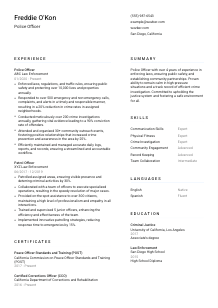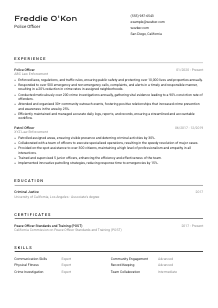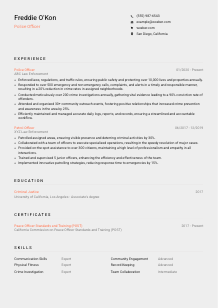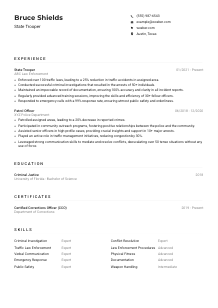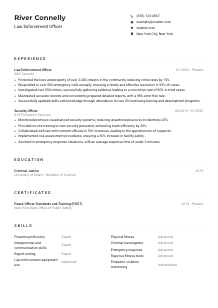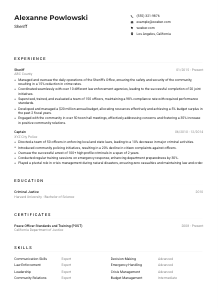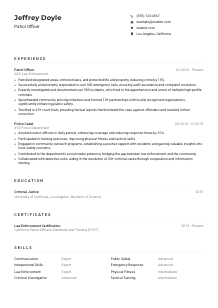Police Officer CV Example
Upholding law, but your CV feels unlawful? Patrol this Police Officer CV example, curated with Wozber free CV builder. Discover how to seamlessly present your policing prowess to meet job stipulations, ensuring your career remains "ten codes" ahead!
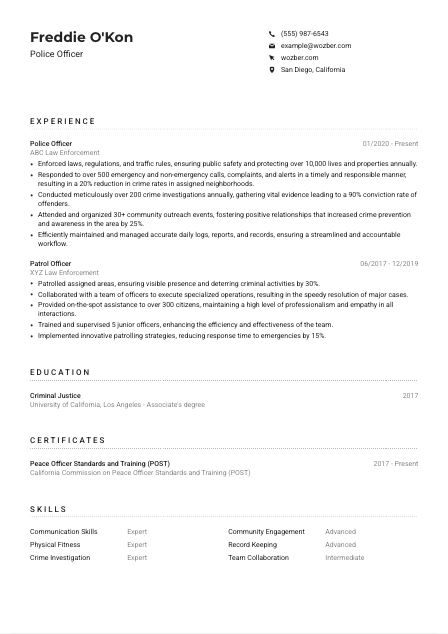
How to write a Police Officer CV?
Hello, aspiring Police Officer! In the world of law enforcement, standing out in the job market isn't just about showcasing your skills – it's about crafting a CV that speaks directly to the needs of your potential employer. Today, you're not just here to learn; you're here to become the top candidate for that Police Officer position you've got your eye on.
Using Wozber's free CV builder, we're going to take you step by step through creating an ATS-compliant CV that not only meets the stringent requirements of a Police Officer position but also propels you ahead of the competition. Let's turn your aspirations into your next career move!
Personal Details
Your personal details are the beacon that guides hiring managers to your professional doorstep. Tailoring this section for a Police Officer position is your first step in highlighting your readiness for duty.
1. Brand Yourself
Kick things off with your name in a clear, commanding font. As a Police Officer, your name represents your authority and professionalism in the community, so make sure it stands front and center on your CV.
2. Specify Your Role
Just below your name, spotlight the job title you're aiming for - "Police Officer". This targets your application and makes it immediately clear to the hiring manager what position you're gunning for, aligning your ambitions with the needs of the law enforcement agency.
3. Crucial Contact Details
In law enforcement, reliability is key. Include your most dependable contact number and a professional email address to show you're always reachable for a call to action. A format like firstname.lastname@email.com underscores your professionalism.
4. Affirm Your Location
"Located in San Diego, California," this simple statement immediately assures the hiring manager that you're ready and available in the jurisdiction needing your services, eliminating any concerns about relocation.
5. Professional Presence Online
If relevant, include a LinkedIn profile URL. Ensure it's polished and reflects the same level of professionalism as your CV. In today's digital age, a well-maintained online presence can be as telling as your in-person demeanor.
Takeaway
Think of your personal details as your professional greeting – crisp, clear, and precise. It's the first step to showing you're a contender not only well-prepared for the job but also ready to serve and protect the community as a Police Officer.





Experience
The experience section is where you bring your policing proficiency to light. Here's how to frame your law enforcement journey to reflect the ideal fit for the Police Officer role.
- Enforced laws, regulations, and traffic rules, ensuring public safety and protecting over 10,000 lives and properties annually.
- Responded to over 500 emergency and non‑emergency calls, complaints, and alerts in a timely and responsible manner, resulting in a 20% reduction in crime rates in assigned neighborhoods.
- Conducted meticulously over 200 crime investigations annually, gathering vital evidence leading to a 90% conviction rate of offenders.
- Attended and organized 30+ community outreach events, fostering positive relationships that increased crime prevention and awareness in the area by 25%.
- Efficiently maintained and managed accurate daily logs, reports, and records, ensuring a streamlined and accountable workflow.
- Patrolled assigned areas, ensuring visible presence and deterring criminal activities by 30%.
- Collaborated with a team of officers to execute specialized operations, resulting in the speedy resolution of major cases.
- Provided on‑the‑spot assistance to over 300 citizens, maintaining a high level of professionalism and empathy in all interactions.
- Trained and supervised 5 junior officers, enhancing the efficiency and effectiveness of the team.
- Implemented innovative patrolling strategies, reducing response time to emergencies by 15%.
1. Decipher the Job Ad
Examine the job description and highlight key responsibilities and experiences. This will serve as your guide to tailor your CV, ensuring a match with essentials like "enforced laws and regulations" and "conducted crime investigations."
2. Your Law Enforcement Chronicle
Organize your roles from the most recent backward. For each position, include your title, the department or agency, and your tenure. This provides a clear trajectory of your career and growth within the law enforcement field.
3. Showcase Your Achievements
Highlight accomplishments such as reduction in crime rates, successful community engagement events, or high-impact investigations you've led. Use action verbs and quantify your successes to demonstrate your tangible impact on public safety.
4. Numbers Talk
Whenever possible, throw in stats like "responded to over 500 emergency calls" or "achieved a 90% conviction rate." This quantifiable data gives hiring managers a concrete sense of your contributions and capabilities.
5. Relevance is Key
Keep your focus laser-sharp on experiences directly mirroring the skills and responsibilities required for the Police Officer role. Extraneous achievements, no matter how impressive, can distract from your core qualifications.
Takeaway
Your experience section is your proof of duty, your badge of honor. By tailoring it to the job at hand, you not only assert your qualifications but also your deep commitment to law enforcement. Here, you're not just a candidate; you're a protector, ready for your next assignment.
Education
Your education lays the groundwork for your service in law enforcement. Let's align your academic achievements with the Police Officer position's expectations.
1. Highlight Required Degrees
Begin with the essentials. If the position requires an "Associate's degree in Criminal Justice," ensure your degree is front and center. Your academic background in criminal justice or a related field signals your foundational knowledge in law enforcement principles.
2. Simple and Straightforward
Present your academic credentials in a clean format – degree, field of study, institution, and graduation year. This clarity shows you value order, an indispensable trait in policing.
3. Addressing the Job Qualifications
If you hold a degree that directly matches the job's education requirements, make it the highlight of this section. This directly correlates your academic preparation with the role's demands.
4. Relevant Coursework and Projects
Especially for roles with specific training requirements, listing pertinent courses or academy training demonstrates your proactive preparation for the demands of police work.
5. Additional Academic Achievements
Any honors, relevant extracurriculars, or projects that underscore your commitment and passion for law enforcement can be a valuable addition. These illustrate not just your academic prowess but your dedication to the field.
Takeaway
Education in law enforcement is more than just academic titles; it's preparation for real-world challenges. Each entry in this section is a building block of your readiness to uphold the law and ensure public safety.
Certificates
In a field where continuous training is critical, your certifications highlight your commitment to staying at the forefront of law enforcement practices.
1. Identify Essential Certifications
Start by pinpointing certifications specifically mentioned in the job posting, such as a "valid Peace Officer Standards and Training (POST) certification." Listing these upfront demonstrates your adherence to essential qualifications.
2. Choose Wisely
Prioritize certificates that resonate with the job's requirements. This emphasizes your targeted preparation for the role, rather than a scattershot approach to professional development.
3. Dates Matter
For certifications, especially those with expiration dates or renewals, including the date of acquisition or the validity period shows your credentials are current, underlining your readiness for duty.
4. Stay Current
Law enforcement is an evolving field. Commit to ongoing professional development to ensure your skills and knowledge base remain on the cutting edge, ready to serve and protect with the most up-to-date practices.
Takeaway
Your certifications are not merely accolades; they are evidence of your unwavering commitment to excellence in policing. They signify your dedication to learning, growth, and maintaining the highest standards of law enforcement.
Skills
Skills are the tools of your trade as a Police Officer. Here's how to showcase them in a way that resonates with the essence of policing.
1. Break Down the Job Ad
Start by identifying key skills listed in the job posting, such as "strong interpersonal and communication skills" and "ability to remain calm in high-pressure situations." These are your benchmarks.
2. Matching Your Arsenal
Pull from your own skill set those competencies that mirror the job requirements. Your ability to handle high-pressure scenarios, effective communication, and conflict resolution skills are prime candidates for inclusion.
3. Organisation is Key
Present your skills in a neat, orderly fashion. This not only makes it easier for hiring managers to scan but also mirrors the organisational skills critical in law enforcement operations.
Takeaway
The skills section is your arsenal showcase, presenting the competencies you bring to the police force. Each skill listed is a testament to your preparedness to serve, protect, and engage positively with the community.
Languages
In a community-oriented profession like policing, language fluency can bridge gaps and foster trust. Here's how to display your linguistic capabilities.
1. Job Requirements First
Verify if the job posting requests specific language proficiencies. Given the requirement for "effective command of the English language," placing this at the forefront is crucial.
2. Highlight Your Proficiencies
Emphasize the languages essential for the role, prominently featuring your proficiency level to align with the job's needs.
3. More Languages, More Merit
In areas with diverse populations like San Diego, additional language skills, such as Spanish fluency, can be immensely valuable in community policing efforts. Showcase these skills to demonstrate your versatility.
4. Be Honest With Your Level
Clarity about your language proficiency level is key. Whether you're native, fluent, or intermediate, an accurate representation ensures realistic expectations of your communication capabilities.
5. The Role's Linguistic Scope
In positions where interaction with a diverse community is a daily reality, your multilingual abilities can significantly enhance your effectiveness as a Police Officer, offering a deeper connection with the community you serve.
Takeaway
Your language skills are a powerful tool in your policing toolkit, offering more than just communication ability – they represent understanding, empathy, and the capacity to serve a diverse community with respect and sensitivity.
Summary
A compelling summary introduces you as the ideal candidate for the Police Officer position, concisely capturing your professional identity.
1. The Job's Core
Absorb and reflect on the essence of the job requirements. Crafting a summary that speaks directly to the heart of what it means to be a Police Officer sets the stage for a CV that resonates with hiring managers.
2. An Opening Statement
Begin with a powerful introduction to yourself as a professional. Mention your years of experience in law enforcement to establish your footing in the field right off the bat.
3. Your Career Highlights
Briefly touch on your key accomplishments and the unique impact you've had in your roles. This is your chance to condense your professional narrative into a few punchy lines that capture your contributions and capabilities.
4. Brevity is Virtue
Keep it concise. Your summary is the hook that catches the hiring manager's interest, enticing them to dive deeper into your CV. Aim for a succinct yet impactful snapshot of your professional persona.
Takeaway
Your summary is more than an introduction; it's your elevator pitch, your chance to make a memorable first impression. A well-crafted summary invites the hiring manager to discover the depth of your experience and the breadth of your commitment to law enforcement.
Launching Your Police Officer Journey
Armed with these detailed steps and guided by Wozber's free CV builder, you're now fully equipped to craft an ATS-compliant CV that not only ticks every box but also sets you apart as the ideal candidate for your next Police Officer role. Remember, your CV is more than a document; it's a testament to your dedication, readiness, and the unique value you bring to the badge. Seize this opportunity to highlight your policing prowess with an ATS-friendly CV template and leverage the power of ATS optimisation with Wozber's ATS CV scanner.
Your journey is calling – answer it with confidence. The badge awaits.

- Minimum of a high school diploma or equivalent;
- Associate's degree in Criminal Justice or related field preferred.
- Completion of a certified police academy program with a valid Peace Officer Standards and Training (POST) certification.
- Minimum of 2 years of experience in a law enforcement or related field.
- Strong interpersonal and communication skills, with the ability to remain calm and composed in high-pressure situations.
- Must pass a physical fitness test, background investigation, and psychological evaluation.
- Effective command of the English language is a must.
- Must be located in San Diego, California.
- Enforce laws, regulations, and traffic rules, ensuring public safety and protecting lives and property.
- Respond to emergency and non-emergency calls, complaints, and alerts in a timely and responsible manner.
- Conduct initial crime investigations, gather evidence, and interview witnesses/victims.
- Attend community outreach events and foster positive relationships with the public to promote crime prevention and awareness.
- Maintain accurate daily logs, reports, and records of activities, incidents, and investigations.





